I’ve spent the last week in mostly reception-free zones of Northern California trying to pay attention to the view, to granddaddy sugar pines, to river osprey, and to my wife, instead of to my computer. I did a lot of reading and zero reporting. So this post will be a bit of a detour from the thrust of our GM foods adventure.
Back when I started my research, I grabbed every book I could find on transgenic foods, and as I stared down this stack I yearned for a guide: Something to tell me which books were bogus, which were credible, and what assumptions each author started with. I had to do without that guide, but now that I’ve plowed through a first wave of reading, I’m in a position to create one. So, if this series I’ve been writing on GM foods has whetted your appetite for a comprehensive review of this subject (or if you just want to cheat with the one-paragraph version), here’s the guide I wished I’d had.
(Scale: Pro GM = 0, anti = 10, neutral = 5)
 Seeds of Deception
Seeds of Deception
by Jeffrey Smith
Scale: 10
I set this down after reading a few lines that made me scratch my head, and did not pick it up again, on the advice of Margaret Mellon, staff scientist for the Union of Concerned Scientists (which opposes genetically modified foods). 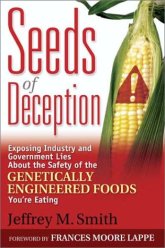 There’s plenty of people who see the slightest suggestion of caution, in any scientific paper, as damning proof that genetically modified food is killing us. It’s all too easy to find dangers lurking in every study if you are convinced they are there. “And that kind of over-reading of the science is what you will find over and over again if you look at Jeffrey Smith’s book,” Mellon said.
There’s plenty of people who see the slightest suggestion of caution, in any scientific paper, as damning proof that genetically modified food is killing us. It’s all too easy to find dangers lurking in every study if you are convinced they are there. “And that kind of over-reading of the science is what you will find over and over again if you look at Jeffrey Smith’s book,” Mellon said.
In other words, skip it, and take Smith with a shaker of salt.
[UPDATE: After this post was published, Mellon contacted Grist and said she’d believed her comments about Seeds of Deception would be for background only (not quoted). She says she “advocates that people read widely on the topic of genetic engineering, including both critics and supporters of the technology.” In addition, she says the Union of Concerned Scientists “is not opposed to GE, but we are critics of its current applications.”]
 Food, Inc.
Food, Inc.
by Peter Pringle
Scale: 6
This is the book I’d recommend if I had to pick just one. Evenhandedly reported and expertly written, Food, Inc. gets into science, politics, and power in a slim 200 pages. Pringle doesn’t chase every contention down its rabbit hole, but he picks his topics well. The result is an elegant volume that leaves the reader with a sense of what’s real and what’s not. Unlike a lot authors on this topic, Pringle talks to experts on both sides and tries to fully 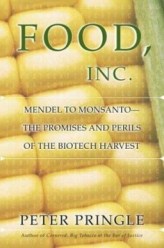 communicate their arguments. But that doesn’t mean he’s stupidly objective. Pringle doesn’t mince words in criticizing the relentlessly anti-GMO scientist Mae Wan Ho, for instance: “In the consumer’s struggle to understand scientific complexities, Ho is an unhelpful tutor, leaving the consumer caught in the middle, mistrusting both her voice and the voice of her critics.”
communicate their arguments. But that doesn’t mean he’s stupidly objective. Pringle doesn’t mince words in criticizing the relentlessly anti-GMO scientist Mae Wan Ho, for instance: “In the consumer’s struggle to understand scientific complexities, Ho is an unhelpful tutor, leaving the consumer caught in the middle, mistrusting both her voice and the voice of her critics.”
That’s not a bad characterization of the whole mess, actually.
 Mendel in the Kitchen
Mendel in the Kitchen
by Nina Fedoroff and Nancy Marie Brown
Scale: 3
The most comprehensive book on this list, in terms of the science. The authors give a detailed history of agricultural biotechnology, patiently picking apart the controversies one by one. It’s a great backgrounder for each major dust-up. The book is thorough and fair, but it is also very clearly making an argument in favor of genetic engineering, which leaves the reader wondering if there are other facts that might have been emphasized. It’s full of good factoids: From this book I learned that 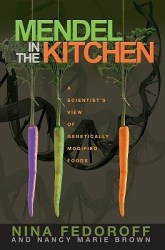 the most popular grapefruit, the Rio Red, was created by exposing seeds to radiation at Brookhaven in 1968. Another nugget: Fiorello La Guardia agreed to change his crucial vote and allow the patenting of plants in 1930 after reading plant breeder Luther Burbank’s complaint: “A man can patent a mouse trap or copyright a nasty song, but if he gives to the world a new fruit that will add millions to the value of the earth’s annual harvests he will be fortunate if he is rewarded by so much as having his name connected with the result.”
the most popular grapefruit, the Rio Red, was created by exposing seeds to radiation at Brookhaven in 1968. Another nugget: Fiorello La Guardia agreed to change his crucial vote and allow the patenting of plants in 1930 after reading plant breeder Luther Burbank’s complaint: “A man can patent a mouse trap or copyright a nasty song, but if he gives to the world a new fruit that will add millions to the value of the earth’s annual harvests he will be fortunate if he is rewarded by so much as having his name connected with the result.”
 Intervention
Intervention
by Denise Caruso
Scale: 7
Caruso has her mind made up: She doesn’t like genetically modified food. But unlike Jeffrey Smith she doesn’t distort the science to favor her conclusions. Instead, she muses on the 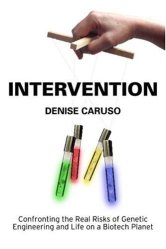 nature of risk. Her point, echoing the National Academies’ Understanding Risk, is that when experts do risk assessments they are frequently blinkered by their own assumptions. The decision to introduce a new technology should be a political, values-driven process, she argues. How do you do this practically? Force foes from either side to work together in assembling a plan, and in the process they will expose each other’s blind spots.
nature of risk. Her point, echoing the National Academies’ Understanding Risk, is that when experts do risk assessments they are frequently blinkered by their own assumptions. The decision to introduce a new technology should be a political, values-driven process, she argues. How do you do this practically? Force foes from either side to work together in assembling a plan, and in the process they will expose each other’s blind spots.
 Tomorrow’s Table
Tomorrow’s Table
by Pamela Ronald and Raoul Adamchak
Scale: 3
Ronald works on rice genetics at U.C. Davis. Adamchak, her husband, teaches organic farming and 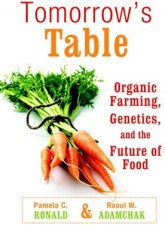 works on Full Belly Farm. Together, they argue that people who are concerned about the problems of industrial agriculture should be precisely the ones supporting genetically modified foods. In a debate where arguments tend to start from such different assumptions, it’s interesting to see the likes of E.F. Schumacher cited in favor of genetic engineering.
works on Full Belly Farm. Together, they argue that people who are concerned about the problems of industrial agriculture should be precisely the ones supporting genetically modified foods. In a debate where arguments tend to start from such different assumptions, it’s interesting to see the likes of E.F. Schumacher cited in favor of genetic engineering.
 Pandora’s Picnic Basket
Pandora’s Picnic Basket
by Alan McHughen
Scale: 4
This book feels a tad disingenuous because it starts out with fiery, seemingly anti-GMO language (the first words: “Don’t eat another bite until you read this book”), but then goes on to calmly refute these concerns without pausing to explain the contradiction. A bad editor, or McHughen’s alter ego, must have decided he needed to sex things up.  The result is a strangely uneven book, with jacket copy that reads, “Did you know that some tomatoes now contain fish genes?” and then a section on that point explaining, basically: No they don’t (I’m paraphrasing). Apparently, the fish gene was a concept that never actually worked. Still, it’s worth skipping past the flash and dazzle for the discussion of why antibiotic-resistance markers are nothing to worry about (because kanamycin-resistant genes are already in bacteria everywhere), and the careful analysis of the L-tryptophan debacle.
The result is a strangely uneven book, with jacket copy that reads, “Did you know that some tomatoes now contain fish genes?” and then a section on that point explaining, basically: No they don’t (I’m paraphrasing). Apparently, the fish gene was a concept that never actually worked. Still, it’s worth skipping past the flash and dazzle for the discussion of why antibiotic-resistance markers are nothing to worry about (because kanamycin-resistant genes are already in bacteria everywhere), and the careful analysis of the L-tryptophan debacle.
There were several other good books in that stack, but these are the ones that addressed the issue most directly. Now, as I wade into the political and economic arguments, I’m starting First the Seed. If there are books I’ve missed I’d love to get your one-paragraph review in the comments. Next up, we return to the fray, as I ask if scientists who find problems with GM foods are unduly bullied.





